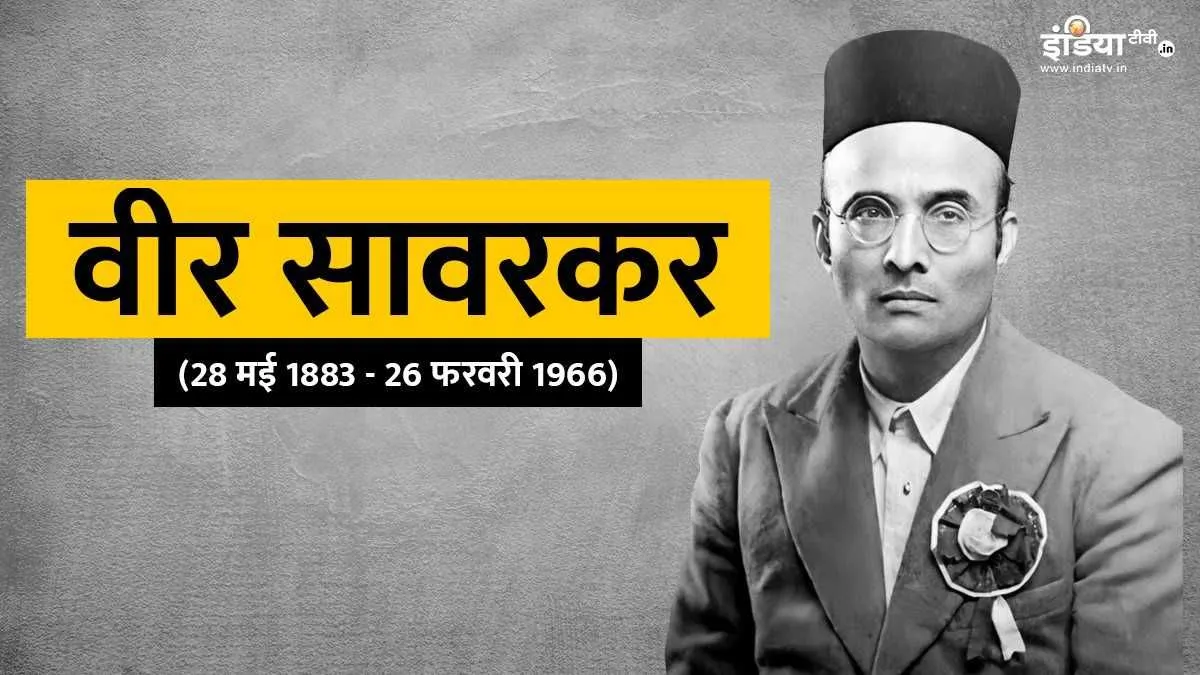
Vinayak Damodar Savarkar alias Veer Savarkar.
Veer Savarkar Birth Anniversary: Veer Savarkar, whose full name was Vinayak Damodar Savarkar, was one of the immortal revolutionaries of the Indian freedom struggle. He shook the foundation of the British rule with his courage, intellectual power and determination. Savarkar became the sizes of the British eyes, because he not only raised the armed revolution, but also ignited the consciousness of freedom in the Indian public through his writing and the ideology of Hindutva. His boldness and ideological firmly used the British. Savarkar made the British realize that he is not just one person, but a symbol of an ideology that was the biggest threat to his empire.
Why was Savarkar threat to the British?
Born on May 28, 1883 in Nashik, Maharashtra, Savarkar played the bugle of rebellion against the British rule from puberty. His book ‘The Indian War of Independence 1857’ presented the first freedom struggle of 1857 as an organized revolution, which the British tried to inferiorly to be inferior. This book was banned by the British, as it was throwing a sense of freedom among Indians. Savarkar established organizations such as ‘Abhinav Bharat’ and ‘Free India Society’ in London, through which he inspired Indian youth for armed revolution. These activities of his scared the British so much that they started monitoring every activity of them.
Savarkar’s fear was also in the mind of the British because he was not only a revolutionary, but also a sharp thinker. His concept of Hindutva worked to unite Indian society, which the British wanted to weaken with the policy of their ‘divide and rule’. There was such a fire of patriotism and self -respect in his writing and speeches that the British feared that this fire would consume their empire.
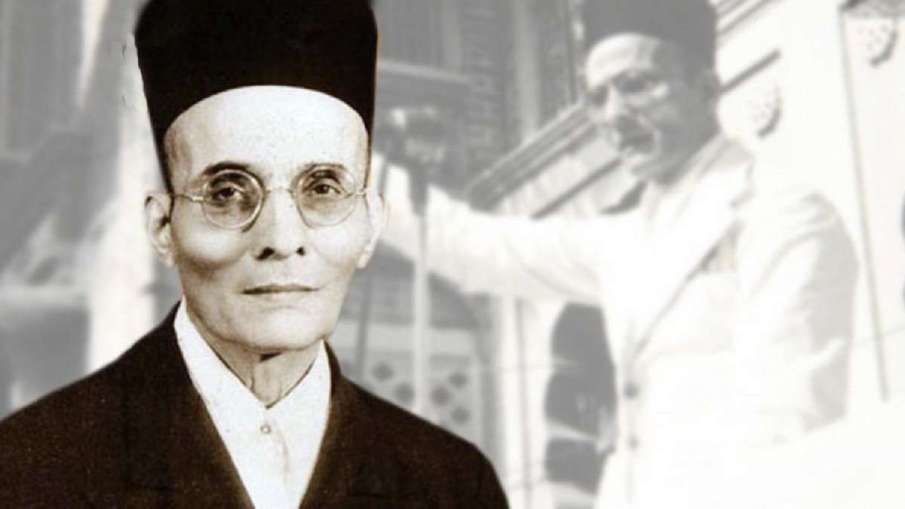
Veer Savarkar is counted among the greatest revolutionaries of the country.
Why was Savarkar sent to Kalapani?
Savarkar’s revolutionary activities directly challenged the British rule, due to which he was arrested in London in 1910. The main reason for his arrest was the Nashik conspiracy scandal, including his Anuj Ganesh Savarkar. In this scandal, a conspiracy to assassinate Nashik collector Jackson was hatched, which was linked by the British to Savarkar. In addition, Savarkar, while living in London, worked to provide weapons training to Indian students and distribute revolutionary literature, which was unbearable to the British. His book ‘The Indian War of Independence 1857’ was considered a dangerous document against the British Empire.
All these activities of Savarkar were so frightened by the British that he arrested him from the French coast to bring Savarkar to India and in 1911, he sentenced him to 2 life imprisonment and sent him to Andaman’s cellular jail, i.e. Kalapani,. The British believed that inhuman torture of Kalapani would crush Savarkar’s revolutionary views, but Savarkar did not give up there either.
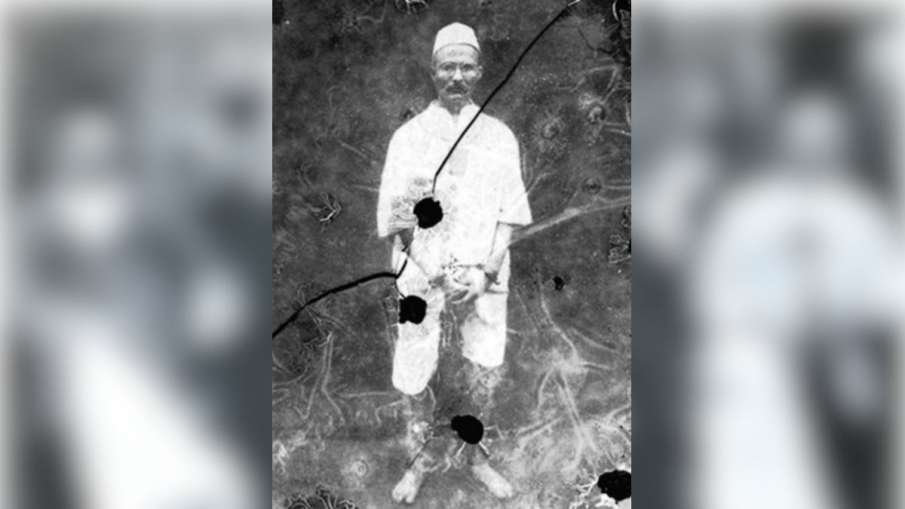
Veer Savarkar in jail clothes.
Savarkar’s contribution to freedom struggle
Savarkar’s contribution to the freedom struggle was multifaceted. He, along with revolutionaries like Madame Bhikaji Cama and Shyamji Krishna Verma in London, voiced India’s struggle on the global stage. His book ‘The Indian War of Independence 1857’ gave a new direction to the freedom struggle and recognized it internationally. Through ‘Abhinav Bharat’, he laid the foundation of the armed revolution, which inspired many youths. Nashik Conspiracy Case is an example of this, which shook the British rule. During Kalapani’s sentence, Savarkar kept his views alive despite the inhuman tortures of the Cellular Jail.
Savarkar wrote poems on the walls of the prison, which later became an inspiration for freedom fighters. His classical creation ‘Hindutva: Hu is a Hindu?’ Gave a new dimension to Indian culture and identity. Savarkar connected social reforms to the freedom struggle through the Hindu Mahasabha. He worked on issues such as untouchables, women’s rights and social harmony, which gave a wide basis for freedom struggle.
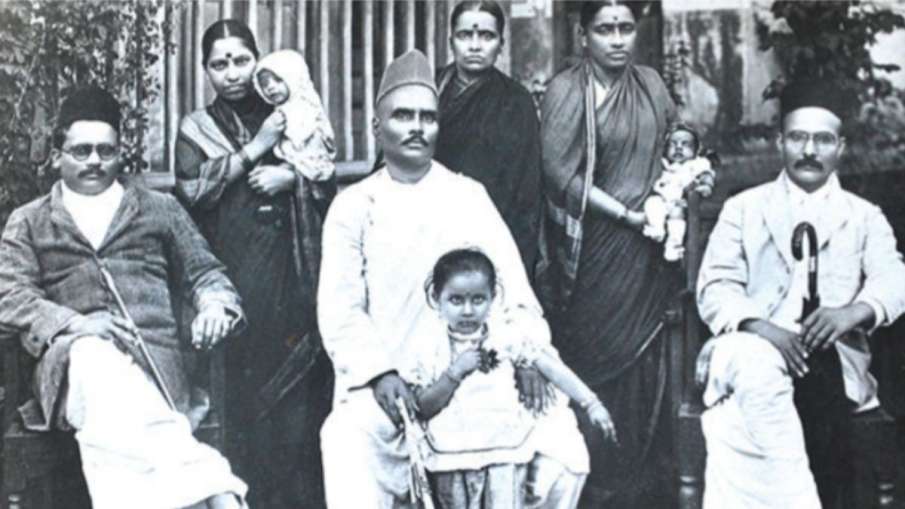
Veer Savarkar with his family.
Savarkar’s criticism
Savarkar, a leading revolutionary and thinker of the Indian freedom struggle, still lives at the center of criticism by some people. They are criticized mainly due to some specific reasons, such as his alleged apology petitions, the ideology of Hindutva, and the alleged cooperation with the British. However, these criticisms can be considered incorrect or exaggerated based on historical facts and references. Savarkar’s contribution and criticism without understanding his circumstances is not only unfair, but also an attempt to reduce his incomparable contribution of the freedom struggle.
Mercy Petitions: Some people accuse Savarkar that they wrote apology petitions to the British during Kalapani’s sentence in Andaman’s cellular jail and signed an agreement for their release. Critics claim that this reflects their weakness and lack of patriotism.
Refutation: This criticism ignores the historical context. Savarkar was sentenced to 2 life imprisonment in 1911, which was the most rigorous punishment for any freedom fighter at that time. Inhuman torture in Cellular Jail, such as a bull in the crusher, was designed to break food, and solitude imprisonment, prisoners. Savarkar wrote apologies petitions, but these petitions were strategic, as many revolutionaries and politicians at that time had given such petitions to be released from jail. This was a common process for their release, not a symbol of lack of patriotism. Even after the release, Savarkar strengthened the freedom struggle through the Hindu Mahasabha and promoted social reforms. Seeing their petitions as a weakness is to reduce their struggle and sacrifice.
The ideology of Hindutva: Some people consider Savarkar’s concept of Hindutva communal and divisive. His book Hindutva: Hu is a Hindu? Based on the basis, critics say that this ideology was against minorities and weakened national unity.
Refutation: Savarkar’s Hindutva was a symbol of cultural and national unity, not religious fanaticism. He defined Hindutva as a cultural identity, giving importance to India’s civilization, history and culture. His Hindutva was inclusive, who talked about united all people born in India, irrespective of their religion. Savarkar worked on issues such as untouchables and social harmony, which reflects his inclusive thinking. The purpose of his ideology was to compete with the British policy of ‘divide and rule’. Calling it communal is a misinterpretation of historical facts.
Alleged cooperation with the British: Some critics claim that Savarkar collaborated with the British after his release and distanced the freedom struggle.
Refutation: This allegation is completely baseless. Savarkar was released in 1924, but was kept under house arrest in Ratnagiri, where his activities were strictly monitored. Despite this, he continued to work on social and national issues through the Hindu Mahasabha. He emphasized untouchability, women’s rights, and organization of Hindu society, which provided social basis to freedom struggle. His strategy had changed, but his goal was the same, India’s freedom and empowerment. It is wrong to say that he kept distance from the freedom struggle.
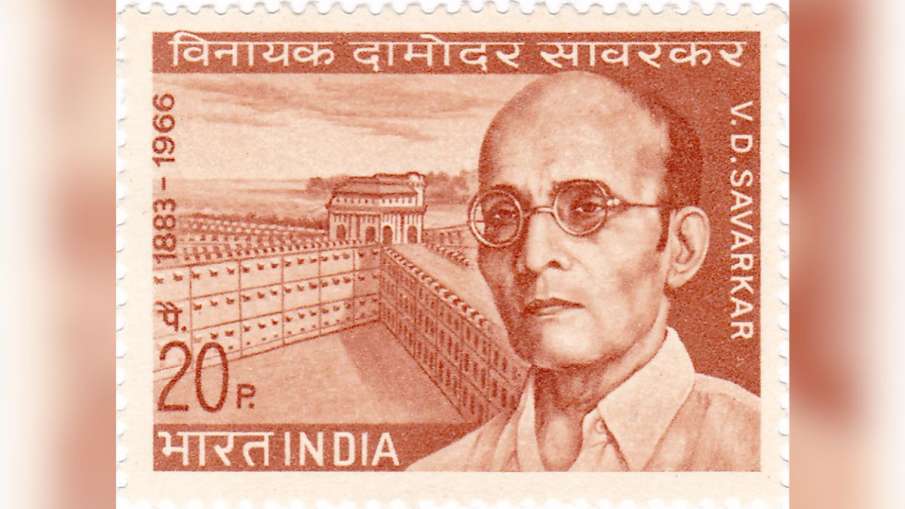
A postage stamp was issued in 1970 on Veer Savarkar.
Why is Savarkar criticized?
Savarkar is often criticized by distorting or reference to historical facts. Their criticism can be said to be senseless because:
Historical reference ignoring: It is wrong to understand Savarkar’s apology petitions without his circumstances and the strategy of that time. Kalapani’s sentence was so cruel that living was a struggle in itself. His petitions were a strategy for release, not evidence of lack of patriotism.
Conceptual bias: Savarkar’s ideology of Hindutva as communal is an ideological prejudice. The purpose of his ideology was to unite Indian society, which was a threat to the British. It misunderstood this reduces the thinking of their national unity.
To ignore the contribution: Savarkar not only inspired the armed revolution, but also gave an intellectual and ideological basis to the freedom struggle through his books. In Kalapani, tolerate inhuman torture for 11 years and still keeping ideas alive is a proof of their courage and dedication.
Political selfishness: Savarkar’s criticism is sometimes inspired by political interests. By incorrectly presenting the ideology of Hindutva, some people promote their ideological agenda, which is injustice to the historical truth.
Savarkar never learned to give up
Veer Savarkar was a revolutionary whose courage, intellectualism and ideology shook the British rule. His revolutionary activities, especially the Nashik Conspiracy Case and the Indian War of Independence 1857 made him the British eye disgrace, due to which he was sentenced to Kalapani. Nevertheless, he did not give up and gave a new direction to the freedom struggle with his thoughts. Savarkar’s contribution was not only limited to the armed revolution, but his ideological and social initiative united and empowered Indian society. Therefore, he should be included among the greatest fighters of the freedom struggle, because his life and thoughts still inspire us.
Latest india news